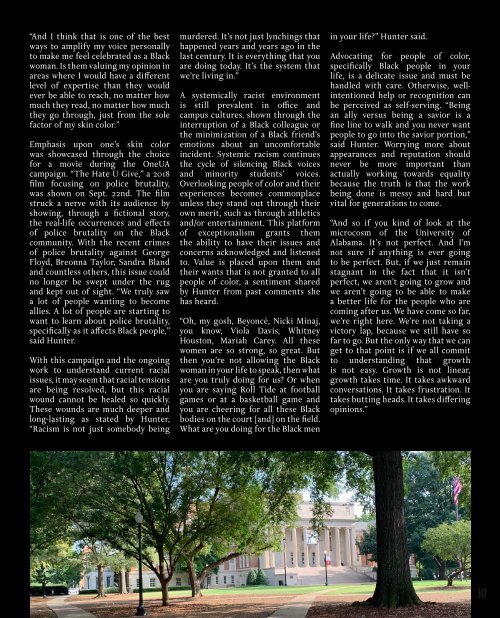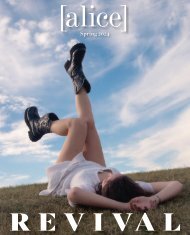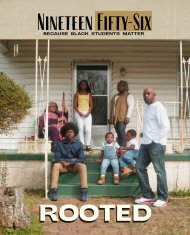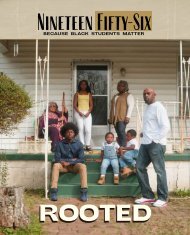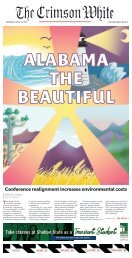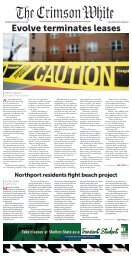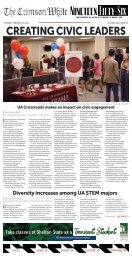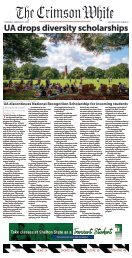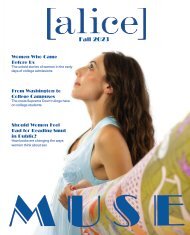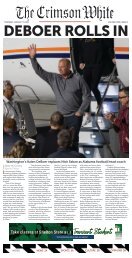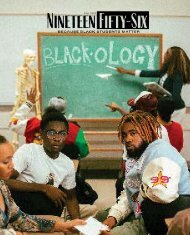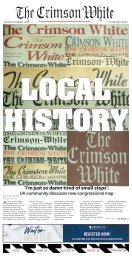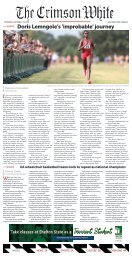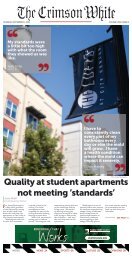Nineteen Fifty-Six Vol. 1 No. 2 Voice
This is the October issue of Nineteen Fifty-Six magazine. The theme, Voice: Your Voice has Value, is especially important in the weeks leading up to the presidential election.
This is the October issue of Nineteen Fifty-Six magazine. The theme, Voice: Your Voice has Value, is especially important in the weeks leading up to the presidential election.
Create successful ePaper yourself
Turn your PDF publications into a flip-book with our unique Google optimized e-Paper software.
“And I think that is one of the best<br />
ways to amplify my voice personally<br />
to make me feel celebrated as a Black<br />
woman. Is them valuing my opinion in<br />
areas where I would have a different<br />
level of expertise than they would<br />
ever be able to reach, no matter how<br />
much they read, no matter how much<br />
they go through, just from the sole<br />
factor of my skin color.”<br />
Emphasis upon one’s skin color<br />
was showcased through the choice<br />
for a movie during the OneUA<br />
campaign. “The Hate U Give,” a 2018<br />
film focusing on police brutality,<br />
was shown on Sept. 22nd. The film<br />
struck a nerve with its audience by<br />
showing, through a fictional story,<br />
the real-life occurrences and effects<br />
of police brutality on the Black<br />
community. With the recent crimes<br />
of police brutality against George<br />
Floyd, Breonna Taylor, Sandra Bland<br />
and countless others, this issue could<br />
no longer be swept under the rug<br />
and kept out of sight. “We truly saw<br />
a lot of people wanting to become<br />
allies. A lot of people are starting to<br />
want to learn about police brutality,<br />
specifically as it affects Black people,”<br />
said Hunter.<br />
With this campaign and the ongoing<br />
work to understand current racial<br />
issues, it may seem that racial tensions<br />
are being resolved, but this racial<br />
wound cannot be healed so quickly.<br />
These wounds are much deeper and<br />
long-lasting as stated by Hunter,<br />
“Racism is not just somebody being<br />
murdered. It’s not just lynchings that<br />
happened years and years ago in the<br />
last century. It is everything that you<br />
are doing today. It’s the system that<br />
we’re living in.”<br />
A systemically racist environment<br />
is still prevalent in office and<br />
campus cultures, shown through the<br />
interruption of a Black colleague or<br />
the minimization of a Black friend’s<br />
emotions about an uncomfortable<br />
incident. Systemic racism continues<br />
the cycle of silencing Black voices<br />
and minority students’ voices.<br />
Overlooking people of color and their<br />
experiences becomes commonplace<br />
unless they stand out through their<br />
own merit, such as through athletics<br />
and/or entertainment. This platform<br />
of exceptionalism grants them<br />
the ability to have their issues and<br />
concerns acknowledged and listened<br />
to. Value is placed upon them and<br />
their wants that is not granted to all<br />
people of color, a sentiment shared<br />
by Hunter from past comments she<br />
has heard.<br />
“Oh, my gosh, Beyoncé, Nicki Minaj,<br />
you know, Viola Davis, Whitney<br />
Houston, Mariah Carey. All these<br />
women are so strong, so great. But<br />
then you’re not allowing the Black<br />
woman in your life to speak, then what<br />
are you truly doing for us? Or when<br />
you are saying Roll Tide at football<br />
games or at a basketball game and<br />
you are cheering for all these Black<br />
bodies on the court [and] on the field.<br />
What are you doing for the Black men<br />
in your life?” Hunter said.<br />
Advocating for people of color,<br />
specifically Black people in your<br />
life, is a delicate issue and must be<br />
handled with care. Otherwise, wellintentioned<br />
help or recognition can<br />
be perceived as self-serving. “Being<br />
an ally versus being a savior is a<br />
fine line to walk and you never want<br />
people to go into the savior portion,”<br />
said Hunter. Worrying more about<br />
appearances and reputation should<br />
never be more important than<br />
actually working towards equality<br />
because the truth is that the work<br />
being done is messy and hard but<br />
vital for generations to come.<br />
“And so if you kind of look at the<br />
microcosm of the University of<br />
Alabama. It’s not perfect. And I’m<br />
not sure if anything is ever going<br />
to be perfect. But, if we just remain<br />
stagnant in the fact that it isn’t<br />
perfect, we aren’t going to grow and<br />
we aren’t going to be able to make<br />
a better life for the people who are<br />
coming after us. We have come so far,<br />
we’re right here. We’re not taking a<br />
victory lap, because we still have so<br />
far to go. But the only way that we can<br />
get to that point is if we all commit<br />
to understanding that growth<br />
is not easy. Growth is not linear,<br />
growth takes time. It takes awkward<br />
conversations. It takes frustration. It<br />
takes butting heads. It takes differing<br />
opinions.”<br />
30


